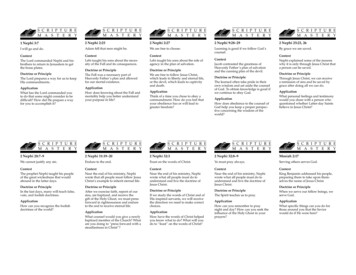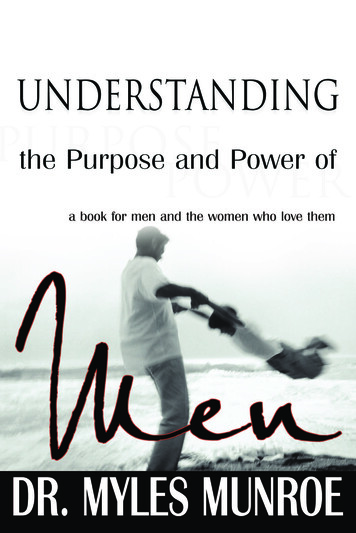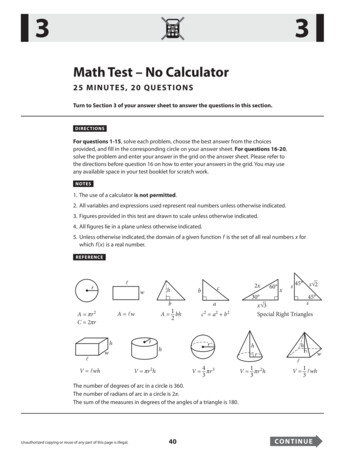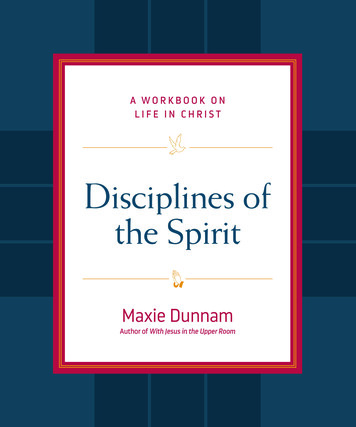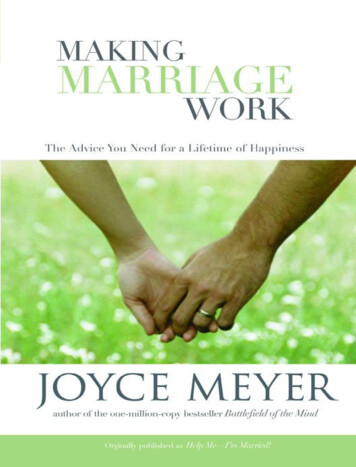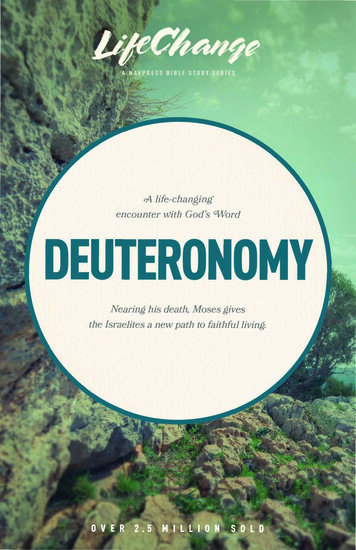
Transcription
All scripture quotations, unless otherwise indicated, are taken from The AmplifiedBible (AMP). The Amplified Bible, Old Testament. Copyright 1965, 1987 byThe Zondervan Corporation. The Amplified New Testament, copyright 1954, 1958, 1987 by The Lockman Foundation. Used by permission.Scripture quotations marked “ NKJV” are taken from the New King James Version.Copyright 1982 by Thomas Nelson, Inc. Used by permission. All rightsreserved.Scripture quotations marked “ NIV” are taken from The Holy Bible, NewInternational Version . NIV . Copyright 1973, 1978, 1984 by InternationalBible Society. Used by permission of Zondervan Publishing House. All rightsreserved.Copyright Joyce Meyer 2006All rights reserved.Warner FaithHachette Book Group USA237 Park Avenue, New York, NY 10017Visit our Web site at HachetteBookGroupUSA.com.First eBook Edition: September 2006ISBN: 978-0-7595-6837-2
ContentsIntroductionPART I: The God-Ordained Gift of ConfidenceChapter One: ConfidenceChapter Two: Setting the Record StraightChapter Three: Does God Use Women in Ministry?Chapter Four: Seven Secrets of a Confident WomanChapter Five: The Woman I Did Not LikeChapter Six: Overcoming Self-DoubtChapter Seven: The Power of PreparationChapter Eight: When The World Says NoChapter Nine: Are Women Really the Weaker Sex?Chapter Ten: Steps to IndependencePART II: Living Boldly and Without FearChapter Eleven: The Anatomy of Fear
Chapter Twelve: Fear Has RelativesChapter Thirteen: The Relationship Between Stress and FearChapter Fourteen: Choosing BoldnessChapter Fifteen: Winners Never QuitChapter Sixteen: Become a Courageous WomanChapter Seventeen: You Go Girl!End NotesAbout the authorTO Contact the Author in the United States:Other Books by Joyce Meyer
INTRODUCTION“A woman has to be twice as good as a man to go half asfar.”—FANNIE HURSTFor most of the world’s existence, women have not enjoyedbeing respected properly, nor have they enjoyed their rightfulplace in society. Although much of that injustice has beencorrected in the Western world, there are still many cultures inthe world where women are terribly mistreated. This is tragic.Women are a precious gift from God to the world. Theyare creative, sensitive, compassionate, intelligent, talented, andaccording to the Bible, equal to men.God created man first—but quickly discovered he neededa helper. Not a slave, but a helper. He created a woman fromone of Adam’s ribs and called her Eve. Note that Eve was takenfrom Adam’s side—from something close to his heart—not thebottom of his feet. Women were never intended to be walkedon, disrespected, bullied, or belittled. Eve was created becauseAdam needed her. God said Adam was not complete without
her. It’s the same today; men need women, and they need themto be more than a cook, housekeeper, sex partner, or babymaking machine.Just to be sure that no one misunderstands my commentthat Adam was not complete without Eve, let me state clearlythat everyone does not have to be married to be complete.And, given that 43% of all first marriages end in divorce—and60% of remarriages—it’s clear that marriage isn’t the be-all,end-all of a happy existence.1While most people desire to get married and have apartner for life, God calls and especially enables many men andwomen to remain single all of their lives. Since this book iswritten especially to women, I want to say emphatically that asa woman you do not have to be married to enjoy your life anddo great things. Just because most women get married, thatdoes not mean something is wrong with you or is missing inyour life if you don’t.
Men and Women: Working Side By SideI believe that most women possess a sixth sense that God didnot give to men. It’s often called women’s intuition, and it’s nomyth. It’s the real deal. Here’s how it works: Men are usuallyvery logical, while women tend to be more “feeling” oriented.For example, a male manager might look at a job candidate’sresume, job application, college GPA, and work history and beready to hire him, based on the “facts.” However, this malemanager’s female counterpart might be guided more byinstinct, by “gut feel.” She might evaluate the same candidateand intuitively pick up on personality quirks or subtle-butdestructive attitudes that don’t show up on paper. This doesnot mean that women are innately better leaders than men orthat their instincts are based on a special God-to-womanfrequency that men aren’t tuned into. In fact, a woman’semotions can also get her into trouble, and she frequentlyneeds the left-brain logic of a man to help her see thingsclearly.The point is that women and men need each other; theycan complement one another—just like the male and femalebosses in the example I’ve just given. Neither the man nor thewoman saw the whole picture clearly or completely. That’s whymen and women should work together, side by side inharmony, respecting one another as equals.For the sake of order, God instructed that if a woman ismarried, she should be submissive to her husband. Now, I
know that a lot of women don’t like that particular “s” word.But think of it this way: You can’t have two people driving acar at the same time, wrestling over the steering wheel andcompeting for the brake pedal. By necessity, one person has tooccupy the driver’s seat. However, it was never God’sintention that women be dominated and made to feel as if theiropinions were of no value. (After all, as my husband Dave willtell you, it’s great to have someone in the car who can sensewhen we’re lost—and isn’t too proud to stop and ask fordirections!)How Well Do You Know the World of Women?A few recent nationwide surveys of women yield manyintriguing revelations about women. Take the followingTrue/False quiz to see how your experience and attitudes stackup with that of other women.1. Most American women get adequate sleep every night.2. Weekends are the only time women get a break fromhousehold responsibilities and chores.3. Most remarriages don’t involve children.4. Most moms say they spend more quality time with theirkids than their own mothers spent with them when they
were children.5. The No.1 thing women wish they had more time for isexercise.6. Most married women are satisfied with the amount oftime they spend with their husbands.7. Time for sex is the No. 1 thing women miss aboutmarried life before kids.8. Most moms say their husbands are the kind of dadsthey thought they’d be.9. Most moms say they—not their husbands—are theproblem solvers in their families.10. The vast majority of moms say they don’t haveenough time for themselves.Answers to “How Well Do You Know the Worldof Women?”1. False. Only 15% of women get at least 8 hours of sleep anight.22. False. Half of today’s women spend their weekendsdoing chores and attending to other householdresponsibilities.33. False. 65% of remarriages involve children from
previous marriages.44. True. 70% of moms say they spend more time with theirkids than their own moms did.55. False. 69% of moms wish they had more time to enjoyfun activities with their kids. Exercise was a closesecond—at 67%.66. False. 79% of women want more time with theirhusbands.77. False. Today’s moms miss time in bed with theirhusbands, but many more of them miss sleeping in(69%) than sex (22%).88. True. 56% of moms say their husbands are the dadsthey envisioned—although they confess that’s notalways a positive thing. On the other hand, some of the44% who gave the opposite answer note that theirhusbands have exceeded their dad-ly expectations.99. True. This answer might shock some men, but 60% ofmoms say they are the family problem-solvers.1010. True. An overwhelming 90% of today’s moms yearnfor more self-time.Due to years of abuse and a wrong worldview towardwomen, many of us have lost the confidence God wants us toenjoy. Our society has an epidemic of insecure people in it.This problem causes great difficulty in relationships and is oneof the reasons divorce is so prevalent today.
Ask 21st-century women, “How do you feel aboutyourself?” and many will confess, “I hate myself.”Ask 21st-century women, “How do you feel aboutyourself?” and many will confess, “I hate myself.” Or, perhapstheir opinion of themselves is not that severe, but they willadmit they really don’t like themselves. Three factorscontribute to this negative attitude.1. A long history of men’s mistreatment of women has leftmany of us with vague feelings that we are somehow“less” than men. Less valuable. Less worthy.2. Our world has created a false, unrealistic image of whatwomen are supposed to look like and act like. But thetruth is that every woman was not created by God to beskinny, with a flawless complexion and long flowinghair. Not every woman was intended to juggle a careeras well as all of the other duties of being a wife, mother,citizen, and daughter. Single women should not bemade to feel they are missing something because theyare not married. Married women should not be made tofeel they must have a career to be complete. If theychoose to, that is wonderful, but we must have thefreedom to be our individual selves.3. Many women hate themselves and have no selfconfidence because they have been abused, rejected,abandoned, or in some way damaged emotionally.
Women need to experience a revival of knowing theirinfinite worth and value. I hope to help initiate just sucha revival through this book.During my childhood, I endured many years of sexualabuse. The abuse profoundly affected my confidence and theimage I carried inside of myself. Inwardly I was very fearful, butoutwardly I presented myself as a tough, bold person whocouldn’t care less what others thought of her. I created a“pretend me” so no one would discover the “real me.” I wasfilled with shame and condemnation over something a man haddone to me, and I must confess that for many years I held arather low opinion of men as a result.Today, however, I believe I am a well-balanced woman. Ihave a wonderful husband and four grown children. I am thepresident and founder of a worldwide media ministry that ishelping millions of people find salvation through Jesus Christ,as well as freedom and wholeness in their lives. My husband,children, and I all work together in the ministry.I have learned a lot on my journey about what “trueconfidence” is, and it will be my great delight to share with youanything I know that can help you be the woman God intendsyou to be. His desire is that you be bold, courageous,confident, respected, admired, promoted, sought after, and,most of all, loved.God has a wonderful plan for your life, and I pray thatreading this book will help you enter it more fully than everbefore. You can hold your head up high and be filled with
confidence about yourself and your future. You can be boldand step out to do new things—even things no man or womanhas ever done before. You have what it takes!
PART IThe God-Ordained Gift of Confidence
Chapter OneWhat is confidence? I believe confidence is all about beingpositive concerning what you can do—and not worrying overwhat you can’t do. A confident person is open to learning,because she knows that her confidence allows her to walkthrough life’s doorways, eager to discover what waits on theother side. She knows that every new unknown is a chance tolearn more about herself and unleash her abilities.Confident people do not concentrate on their weaknesses;they develop and maximize their strengths.For example, on a scale of 1 to 10, I might be a 3 when itcomes to playing the piano. Now, if I were to practice long andhard—and if my husband could put up with the racket—Icould, maybe, transform myself into a middle-of-the road, level5 pianist. However, as a public speaker, I might be an 8. So, if Iinvested my time and effort into this ability, I might just be ableto get to a level 10. When you look at it this way, it’s easy tosee where you need to invest your efforts.The world is not hungry for mediocrity. We really don’tneed a bunch of 4s and 5s running around, doing an averagejob in life. This world needs 10s. I believe everyone can be a 10
at something, but our problem is that we often work so hard ontrying to overcome our weakness that we never develop ourstrengths. Whatever we focus on grows larger in our eyes—too large, in fact. We can turn something into a huge problemwhen, in reality, it would be a minor nuisance if only we viewedit in perspective with our strengths. For example, let’s say youare not a “numbers” kind of person. You struggle to figure outa 15% tip at restaurants, and your checkbook hasn’t beenbalanced since 1987.You could obsess about your inability to “do the math.”You could buy Math for Dummies and other books on thesubject, and maybe even take a class at the community college.But your math obsession could eat up time that could bedevoted to stuff you’re great at—like teaching Sunday school,creative writing, or raising funds for charity. In other words,you might rob time and effort from the 10s in your life just tobring a lowly 3 up to a mediocre 5.Wouldn’t it be much better to delegate the math stuff tosomeone else? Use an online bill-paying system that has builtin ways to catch errors or overdrafts? And you can always askyour dining companions to help you with figuring a tip. Thereare even tip guides you can carry with you.I remember interviewing a man and his wife on ourministry’s television program. I asked the man, who happenedto be a minister, what his weaknesses were. His answer: “Youknow, I don’t concentrate on them. I am sure I have some, but Icouldn’t tell you right now what they are because I just don’tfocus on them.” I laughingly replied that I would ask his wife
later. I was sure she would know his weaknesses, even if hedidn’t. When she joined us later in the broadcast, I promptlypopped that question to her. She replied, “To me, my husbandis perfect; I don’t focus on his weaknesses. He has so manystrengths that I just focus on them and help him be all he canbe.”It didn’t take me long to understand why these two wereso happy and upbeat all the time—and why they had such awonderful marriage. Confident people make it a habit to thinkand act positively. Therefore, they enjoy life, and theyaccomplish a lot.A person without confidence is like an airplane sitting ona runway with empty fuel tanks. The plane has the ability to fly,but without some fuel, it’s not getting off the ground.Confidence is our fuel. Our confidence, our belief that we cansucceed, gets us started and helps us finish every challengewe tackle in life. Without confidence, a woman will live in fearand never feel fulfilled.Confidence allows us to face life with boldness,openness, and honesty. It enables us to live withoutworry and to feel safe. It enables us to live authentically.Confidence allows us to face life with boldness, openness,and honesty. It enables us to live without worry and to feelsafe. It enables us to live authentically. We don’t have topretend to be somebody we’re not, because we are secure inwho we are— even if we’re different from those around us. I
firmly believe that confidence gives us permission to bedifferent, to be unique. God has created every person in aunique way, yet most people spend their lives trying to be likesomeone else—and feeling miserable as a result. Trust me onthis: God will never help you be some other person. He wantsyou to be you! You can be sure of this!People with low confidence, on the other hand, are notsure about anything. They are double-minded, indecisivepeople who constantly get frustrated with life. If they do makea decision, they are tormented by self-doubt. They secondguess (and third-and fourth-guess) themselves. As a result,they don’t live boldly. They live little, narrow lives, and theymiss out on the big, rewarding lives God wants them to enjoy.You may be aware of some of God’s promises for Hispeople—promises for peace, happiness, blessings, and so on.But did you know that all of God’s promises are for everyperson?That’s right—when it comes to fulfilling promises, Goddoes not discriminate. However, He does attach certainconditions to some promises, just as a parent might promise totake a child on an outing as a reward for a good report card.Similarly, God requires us to approach Him in faith—thedeeply held confidence that God is trustworthy and will alwaysmake good on His promises. God loves you; He wants you torelax in the knowledge of that love. He wants you to experiencethe peace of mind that comes from resting in His love andliving without the torment of fear and doubt. Too many peoplecower at the mention of God’s name, because they are afraid
He is sitting up in heaven, just waiting for them to slip up sothat He can punish them. I’m not saying that we never have toface consequences for our actions, but God doesn’t delight inpunishing us. Instead, He wants to bless us and prosper us. Heis merciful and if we are able to receive His mercy, Hefrequently gives us blessing when actually we legally deservepunishment. Thankfully He sees our heart attitude and ourfaith in Jesus and not just our actions.When we have confidence in God and His love andkindness, we can progress to living confidently and enjoyingthe life He wants for us. Note that I said confidence in God, notin ourselves. Usually, when people think of confidence, theythink of self-confidence. Think of how many times you hear TVself-help gurus or athletes urging you to “believe in yourself!”I beg to differ. I want to make it clear, right from the start, thatour confidence must be in Christ alone, not in ourselves, not inother people, not in the world or its systems. The Bible statesthat we are sufficient in Christ’s sufficiency (Philippians 4:13),so we might also say that we are confident through Christ’sconfidence. Or another way to say it would be, “we have selfconfidence only because He lives in us and it is His confidencethat we draw on.”Imagine you’re a member of a basketball team, captainedby a point guard who is the most talented and most courtsavvy player in the world. Not only can this athlete outplayanyone else on the court, she can also bring out the best in herteammates. You can enter each game with confidence, knowingthat your team leader has the knowledge and skill to lead you
to victory. Sure, you will need to do your part, fulfill your roleon the team, but even if you have an off-game, your superstarwill have you covered. She’s got your back. And, as each gameunfolds, you find that your leader’s confidence is contagious.You can play boldly, because your captain inspires you.So, if I say I am confident, which I frequently do, I don’tmean that I am confident in myself or my abilities. I mean that Iam confident in my leader, God, and the gifts, talents, andknowledge He has placed in me. I know that without Him I amnothing (John 15:5), but with Him, I can be a champion,because He brings out the best in me. . . we glory and pride ourselves in Jesus Christ, and putno confidence or dependence [on what we are] in theflesh and on outward privileges and physical advantagesand external appearances. (Philippians 3:3)
Are You SufferingDeficiency?fromConfidenceUnder-confidence is a condition; it might even be considered asickness. And just like many other sicknesses, underconfidence is caused by a deficiency of one thing (confidence)and too much of another—in this case—fear. I refer to fear asan emotional virus because it begins as a thought in your head,then affects your emotions and behaviors—just like a flu virusmight invade your body via a handshake or a sneeze and thenmake you feel miserable all over.Fear is a dangerous virus, because a fearful person has noconfidence and can never reach her potential in life. She won’tstep out of her comfort zone to do anything—especiallysomething new or different. Fear is a cruel ruler, and itssubjects live in constant torment.It breaks my heart when I see people living fearfully,because without confidence, people can never know andexperience true joy. The Holy Spirit of God Himself is grieved,because He has been sent into our lives to help us fulfill ourGod-ordained destinies. But you can’t seek out your destinywhen you’ve let fear slam and lock the door of your life.Instead, you cower behind the door, filled with self-hatred,condemnation, fear of rejection, fear of failure, and fear ofothers.Many victims of fear end up being people-pleasers, proneto being controlled and manipulated by others. They give up
the right to be themselves and usually spend their lives tryingto be what they think they ought to be in someone else’s eyes.Sadly, when we try to be something or someone we arenot intended to be, we stifle ourselves and God’s power in us.When we have confidence, we can reach truly amazingheights; without confidence, even simple accomplishments arebeyond our grasp.Now, you might have read the preceding paragraph—about “amazing heights,” and thought to yourself, Yeah, right,Joyce. I’m not able to do anything amazing. (And I’m scaredof heights too.) Don’t despair if you have thoughts like this.Throughout history, God has used ordinary people to doamazing, extraordinary things. Yet, all of them had to take astep of faith first. They had to confidently press forward intothe unknown or unfamiliar before making any progress. Theyhad to believe they could do what they were attempting to do.“Achieve” comes before “Believe” in the dictionary, but theorder is switched in real life.It’s important to note that, in many cases, successfulpeople have tried many times and failed before they ultimatelysucceeded. They not only had to begin with confidence, theyhad to remain confident when every circumstance seemed toshout at them, “Failure! Failure! Failure!”Consider inventor Thomas Edison. He once said, “I speakwithout exaggeration when I say that I have constructed threethousand different theories in connection with the electriclight, each one of them reasonable and apparently likely to betrue. Yet in two cases only did my experiments prove the truth
of my theory.”That means that Edison developed 2,998 failed theories enroute to arriving at success. In fact, the true story of the lightbulb is a long, tedious tale of repeated trial and error. Imaginehow Edison must have felt as the failures piled up by thedozens, then the hundreds, then the thousands. Yet, through itall, he kept pressing forward. He believed in his bright idea, sohe didn’t lose his determination.1Just because ordinary people take steps to accomplishextraordinary things does not mean that they do not feel fear. Ibelieve the Old Testament hero Esther felt fear when she wasasked to leave her familiar, comfortable life and enter the king’sharem so she could be used by God to save her nation. Ibelieve Joshua felt fear when, after Moses died, he was giventhe job of taking the Israelites into the Promised Land. I know Ihad fear when God called me to quit my job and prepare forministry. I still remember my knees shaking and my legs feelingso weak that I thought I would fall down. I remember the fear Ifelt then, but it frightens me more now to think of how my lifewould have turned out had I not faced the fear and pressedforward to do God’s will. Fear does not mean you are a coward.It only means that you need to be willing to feel the fear and dowhat you need to do anyway.If I would have let the fear I felt stop me, where would I betoday? What would I be doing? Would I be happy andfulfilled? Would I be writing a book right now on being aconfident woman—or would I be sitting at home, depressedand wondering why my life had been such a disappointment? I
believe a lot of unhappy people are individuals who have letfear rule in their lives.How about you, my dear reader? Are you doing what youreally believe you should be doing at this stage in your life, orhave you allowed fear and a lack of confidence to prevent youfrom stepping out into new things—or higher levels of oldthings? If you don’t like your answer, then let me give yousome good news: It is never too late to begin again! Don’tspend one more day living a narrow life that has room for onlyyou and your fears. Make a decision right now that you willlearn to live boldly, aggressively, and confidently. Don’t letfear rule you any longer.It’s important to note that you can’t just sit around andwait for fear to go away. You will have to feel the fear and takeaction anyway. Or, as John Wayne put it, “Courage is beingscared to death, but saddling up anyway.” In other words,courage is not the absence of fear; it is action in the presenceof fear. Bold people do what they know they should do—notwhat they feel like doing.Courage is not the absence of fear; it is action in thepresence of fear. Bold people do what they know theyshould do—not what they feel like doing.As I write these words, I feel very excited for you. I trulybelieve this book will be life-changing for many of you whoread it. It may be a good reminder for some of you, but forothers it will help you step out onto the path of your true life.
The life that has been waiting for you since the beginning oftime—and the one you may have been missing due to fear andintimidation. Satan is the master of intimidation, but once yourealize that he is the one behind all your hesitation, you cantake authority over him by simply placing confidence in JesusChrist and stepping out boldly to be all you can be. God toldJoshua, “Fear not, for I am with you.” He is sending you thatsame message today: FEAR NOT! God is with you, and He willnever leave you, nor forsake you.Abraham was told, “God is with you in all that you do”(Genesis 21:22). That sounds like large living to me. Are youready for a larger life, one that leaves you feeling satisfied andfulfilled? I believe you are, and I want to do everything I can tohelp you on your journey.I know what it is like to live in fear. Fear can actually makeyou sick to your stomach. It can make you so tense andnervous that everyone around you notices that something iswrong; it’s that evident in your facial expressions and yourbody language. What’s more, just as confidence is contagious,so is the lack of self-confidence. When we possess no innerconfidence, no one else has confidence in us either. Imagine atimid, cowering basketball player, standing in the corner of thecourt with her arms wrapped around herself. Is anyone goingto pass her the ball? Is anybody going to call out plays to her?When we think people are rejecting us, we feel hurt bythem. The basketball player in the example above might thinkthat her teammates hate her or have something against her.But, for fearful, under-confident people, the root of the problem
is that they are rejecting themselves. They are rejecting theperson God intended them to be.
A Classic Case of ConfidenceJust as under-confidence comes with its list of symptoms, thesame is true of confidence. A confident person feels safe. Shebelieves she is loved, valuable, cared for, and safe in God’s willfor her. When we feel safe and secure, it’s easy to step out andtry new things. During the initial construction on the GoldenGate Bridge, no safety devices were used and twenty-threemen fell to their deaths. For the final part of the project,however, a large net was used as a safety precaution. At leastten men fell into it and were saved from certain death. Evenmore interesting, however, is the fact that 25% more work wasaccomplished after the net was installed. Why? Because themen had the assurance of their safety, and they were free towholeheartedly serve the project.2When people feel safe, they are free to take a chance onfailing in order to try to succeed. When we know we are lovedfor ourselves and not just our accomplishments orperformance, we no longer need to fear failure. We realize thatfailing at something does not make us a failure at everything.We are free to explore and find out what we are best suited for.We are free to find our own niche in life, which is not possiblewithout stepping out and finding out. Trial and error is the roadto success, and you can’t drive that road as long as your car isparked. So get moving, and God will direct you. When peopleare confident, they try things, and they keep trying until theyfind a way to be successful in what God has called them to do.
Sure, life can sometimes make us feel like we’re in over ourheads, but the reality is that, without God, we’re always in overour heads.For example, a little three-year-old girl felt secure in herfather’s arms as Dad stood in the middle of a swimming pool.But Dad, for fun, began walking slowly toward the deep end,gently chanting, “Deeper and deeper and deeper,” as the waterrose higher and higher on the child. The girl’s face registeredincreasing degrees of panic, as she held all the more tightly toher father, who, of course, easily touched the bottom. Had thelittle girl been able to analyze her situation, she’d have realizedthere was no reason for her increasing fear. The water’s depthin ANY part of the pool was over her head. For her, safetyanywhere in that pool depended on Dad.At various points in our lives, all of us feel we’re getting“out of our depth” or “in over our heads.” There are problemsall around: A job is lost, someone dies, there is strife in thefamily, or a bad report comes from the doctor. When thesethings happen, our temptation is to panic, because we feelwe’ve lost control. But think about it—just like the child in thepool, the truth is we’ve never been in control when it comes tolife’s most crucial elements. We’ve always been held up by thegrace of God, our Father, and that won’t change. God is neverout of His depth, and therefore we’re as safe when we’re inlife’s “deep end” as we were in the kiddie pool.
A Little Godly Confidence Goes a Long WayKatie Brown weighs only ninety-five pounds, and she is just abit over five feet tall. She st
Other Books by Joyce Meyer. INTRODUCTION “A woman
